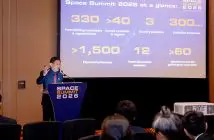
Written by staff writer.
The US Space Force Chief of Space Operations says the United States and its allies must prevent adversaries, including China, from obtaining first-mover advantages in space and manage the calculus to deter them from launching the first strike in space or against space assets.
Speaking at the recent Spacepower Security Forum in Washington D.C., General B. Chance Saltzman said adversarial space nations were probing and pushing the U.S.’s buttons. “That’s what great powers do,” he said. “We have a long history of seeing how that plays out. Our goal is to maintain stability and manage the competition.”
Saltzman said the Space Force, like any defence service, wanted to control the space domain for access and exploitation. He says achieving this helps ensure the security and stability of the U.S. and its allies and partners, like Australia. But he says there is a sophisticated array of space threats, ranging from traditional SATCOM and GPS jammers to more destabilising direct ascent anti-satellite weapons.
“It has become increasingly apparent over the past decade that the Russians and China are coupling space with ISR (intelligence, surveillance, and reconnaissance) with satellite-aided precision-guided munitions,” Saltzman said. “China has more than 470 ISR satellites feeding a robust kill web.”
Specifically referencing the Western Pacific, the general said maintaining domain control was essential to managing this threat. “Space superiority is the US Space Force’s first core function,” he said. “It’s the ability to contest and, when necessary, control the space domain at a time and place of our choosing.”
Acknowledging the build-up of Chinese space capabilities directly designed to counter U.S. control, Saltzman also said the increased capability made China a more rational actor and likely decreased the threat of it initiating any space conflict because the country now needs to protect its space assets. He said China is still working out how to effectively challenge U.S. superiority without putting its capabilities at risk, and the time it takes to do so is working to the US’s advantage.
“It’s starting to play more into our hands,” Saltzman said. “The more time we have, the more resilient we will be. By resilient, I don’t mean we will conduct missile warnings with five or six satellites just hanging over a spot. We are going to do it from a proliferated constellation, so the level of state violence that it would take to deny us the missile warning mission would be orders of magnitude above what it is currently.”
“That has a level of deterrence. Over time, China is becoming more dependent on its own space capabilities. If you have to go to a high level of violence to achieve a single mission effect but in doing so, you create a hazardous debris field that jeopardises your own kill web, it starts to change the calculus.”
He said ensuring that calculus favoured the U.S. and its allies relied on them pursuing and maintaining space superiority in a disciplined way. Saltzman said doing so would result in ongoing access and opportunities to exploit space for scientific, commercial, and defence purposes.





